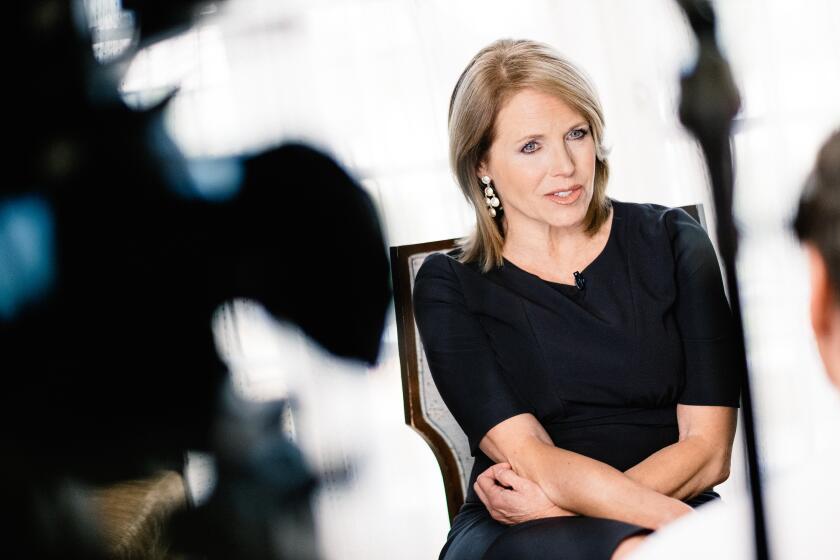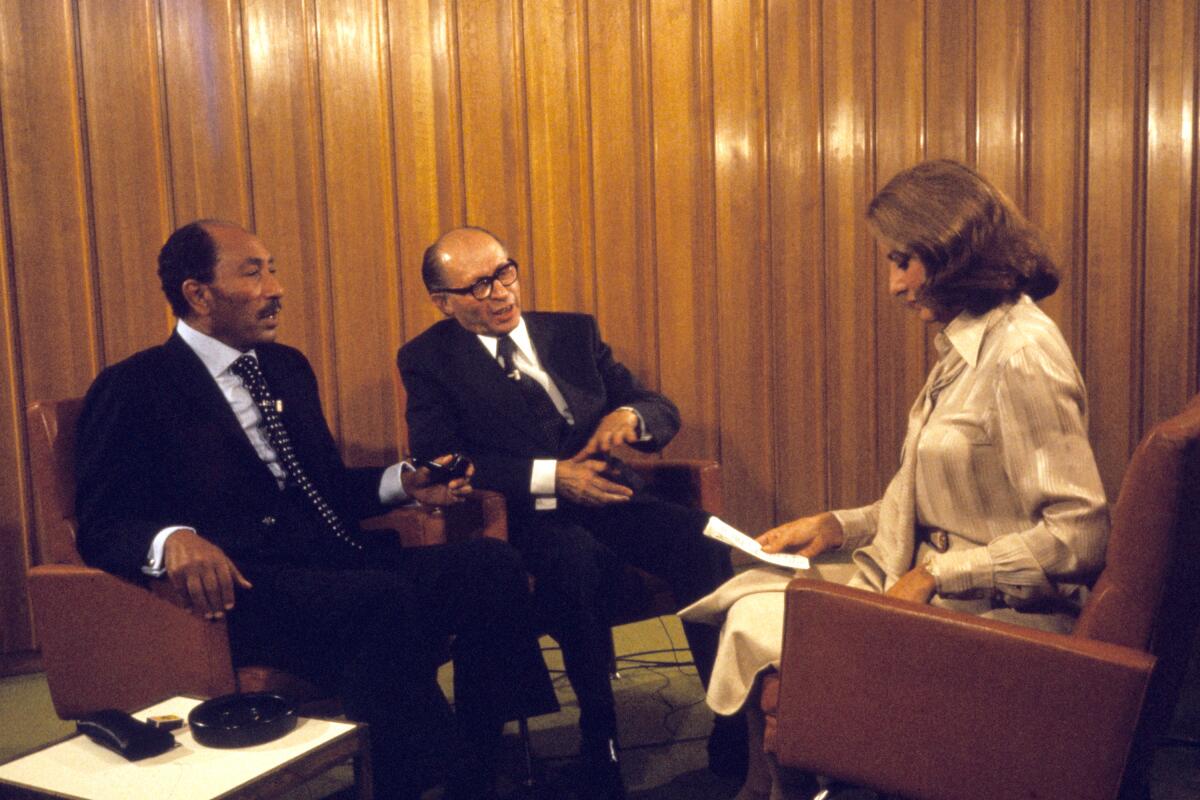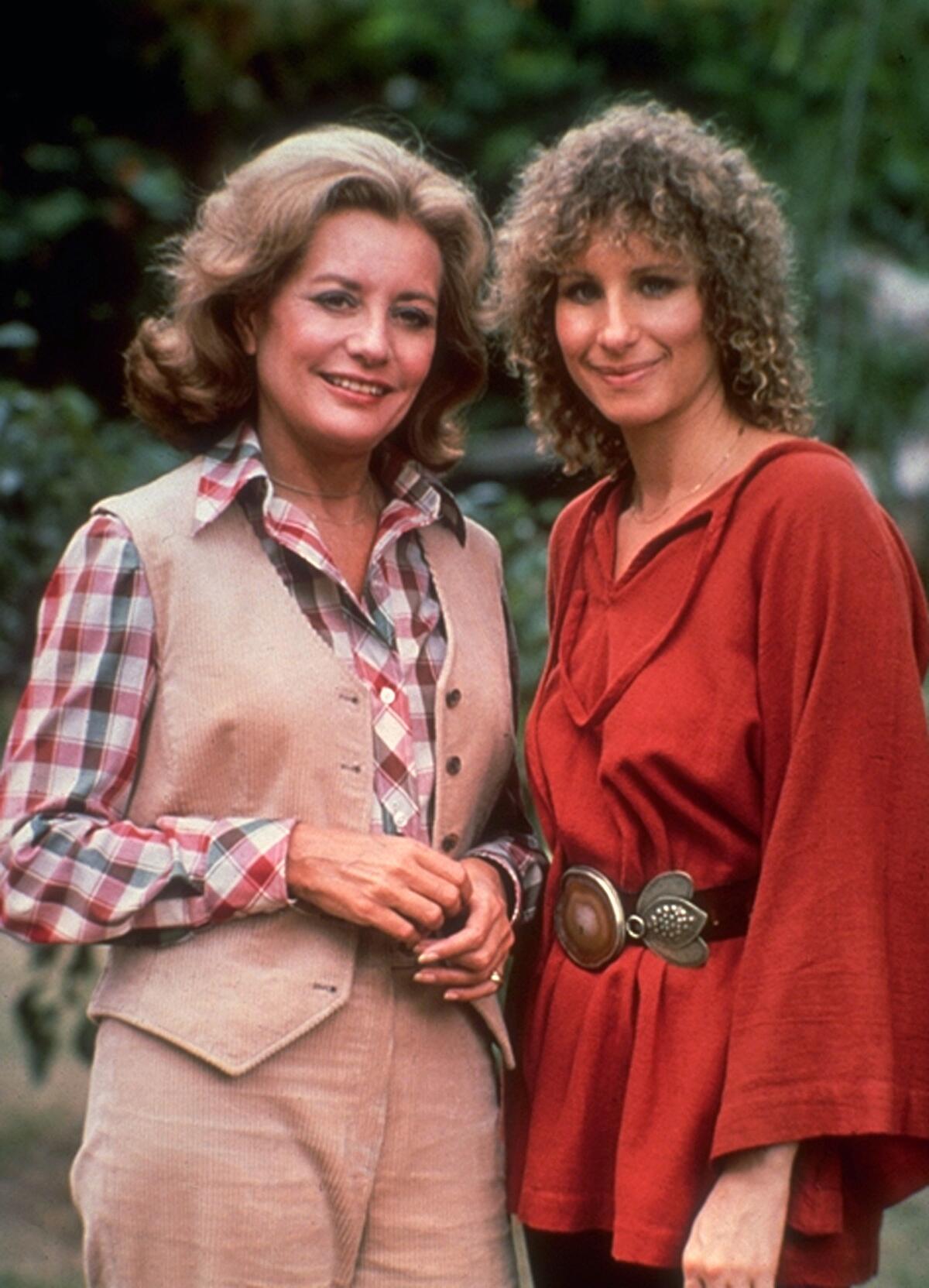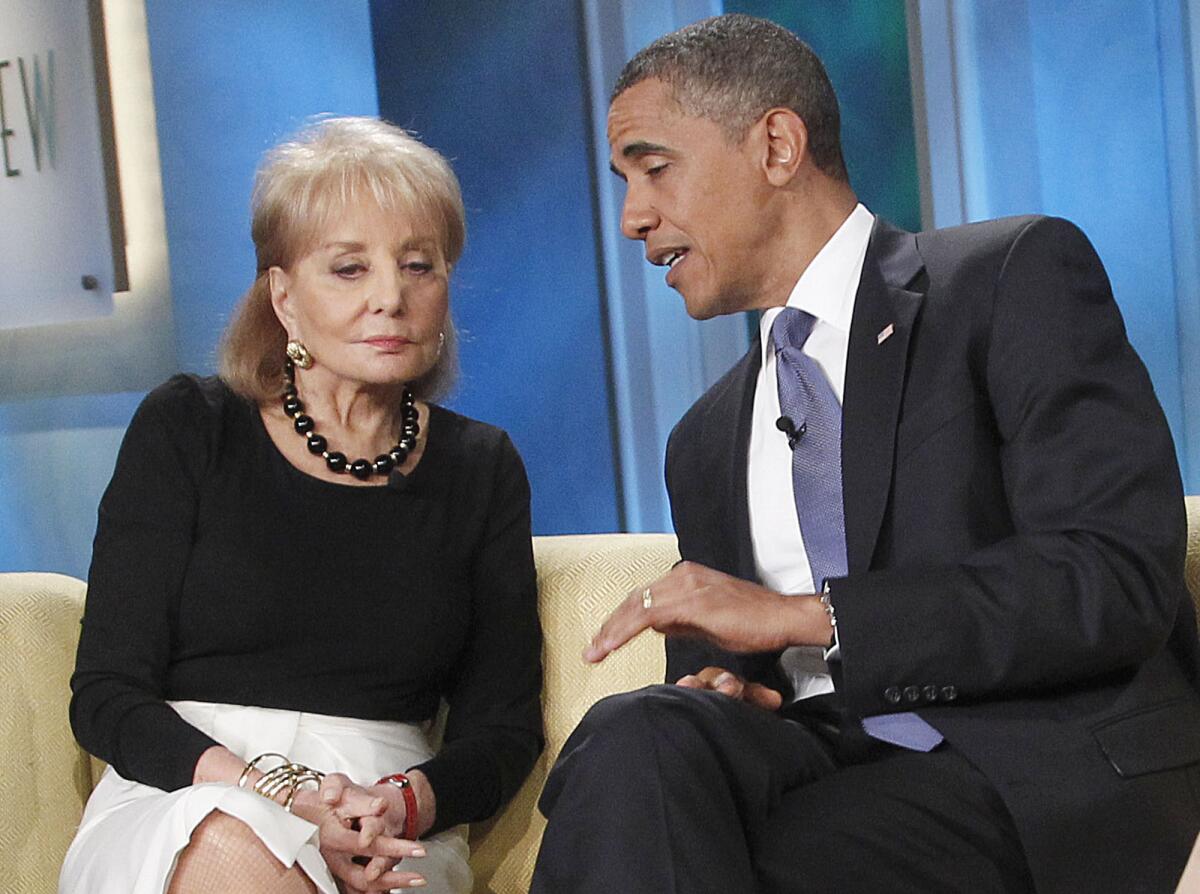
Among all the personalities in television history, none can rival Barbara Walters’ lasting impact and enduring presence.
In the early 60s, she made a name for herself on NBC’s “Today,” significantly boosting the reputation of their morning programming. As one of the first women to anchor on a network, she paved the way for others and turned news interviews into significant television spectacles – over 74 million viewers watched her interview with Monica Lewinsky in 1999. She also contributed to daytime TV history by creating one of its longest-running successes, “The View,” which eventually became a prominent platform for national political discussions.
According to Jackie Jesko, the director of the upcoming documentary “Barbara Walters: Tell Me Everything” on Hulu, the audience that Barbara Walters was able to attract and utilize is exceptional in today’s world. In her words, “everything she did seemed to make an impact.
Jesko’s documentary, co-produced by Brian Grazer, Ron Howard, and their teams at Imagine Documentaries and ABC News Studios, offers an extensive exploration of Barbara Walters’ illustrious career. This film not only delves into Walters’ life but also provides a broad overview of the significant influence network news had on shaping culture during its long-standing reign, as described by Jesko.
Prior to the emergence of social media and podcasts, where celebrities could manage their narratives, undergoing an interview by Barbara Walters offered widespread exposure on a grand scale. David Sloan, a seasoned ABC News producer who collaborated with Walters, remembers how the screenshots of her specials would occasionally flash through the windows of Manhattan’s high-rise apartments.
The project titled “Tell Me Everything” was developed shortly after Walter’s passing in 2022 at the age of 93. Sara Bernstein, president of Imagine Documentaries, discussed this prospect with Betsy West, co-director and executive producer of the Julia Child documentary “Julia.” Both West and Sloan, who had overseen an Emmy-winning tribute following Walter’s death, expressed interest in delving more profoundly into the influence of her career. As former colleagues of Walters, they took on executive producer roles for the film. “Tell Me Everything” draws extensively from the extensive ABC News archives that house numerous interviews conducted by Walters throughout her 40-year tenure at the network.

Instead of just getting hold of the program’s content, you’ll find yourself privy to behind-the-scenes outtakes that lend a realistic, documentary feel to Walter’s work. The recently discovered footage presents some bizarre scenes, like Walter, in a pink Chanel suit, investigating the ruins of Moammar Gaddafi’s former palace in Libya.
“The archive gave us a the perfect canvas to relive her scenes and her moments,” Bernstein said.
Barbara Walters’ narrative offers an insightful journey through the challenging terrain that women navigated in the early television news era, characterized by patriarchal rule and self-importance. Women were often confined to writing light features and barred from hard news coverage. However, Walters boldly broke these barriers with her determination and intelligence. She started as a writer for local TV stations, struggled during a failed CBS morning program, before joining NBC’s “Today” in 1961 where she was hired affordably, as she herself put it.
World & Nation
Similar to numerous individuals belonging to the Baby Boomer demographic, Josh Mankiewicz woke up on June 5, 1968, learning about the tragic news of Senator’s… death.
From producing content for the “Today Girl” segment of the program, Walters transitioned to hosting her own on-air pieces, such as an enchanting piece on a Paris fashion show and a behind-the-scenes glimpse into a day in the life of a Playboy bunny. As time went by, she was given more substantial reporting tasks.
Despite doubting her own attractiveness for TV, Walter’s morning audience adored her. Unfortunately, her career progression was hindered not by her abilities but by male executives reluctant to accept a female as the lead on a network news channel.

By 1971, Walters had become the star of the “Today” show, sharing the screen with host Frank McGee each morning. However, she was not granted equal standing.
In a professional manner reminiscent of an undertaker, McGee advocated to the management that he should pose the initial three questions to any tough news topic being interviewed on “Today”, prior to Walters getting the opportunity.
As a dedicated cinephile, I found myself adapting my interview style due to certain limitations. Instead of confining my discussions within the NBC studios, I ventured out to where my subjects resided or worked. This innovative approach not only granted me greater control over the dialogues but also infused an unprecedented level of intimacy that viewers were otherwise missing on television.
In addition to her agreement, Walters stipulated that should McGee depart “Today,” she would be elevated to the role of co-host. The executives at NBC consented to this clause, assuming McGee would not be leaving.
However, McGee was battling bone cancer, an affliction he’d kept hidden. He passed away in 1974, and Walters ascended to co-hosting duties, becoming the first woman to head a daily network news program. (As Katie Couric puts it bluntly in the film, “She took over literally while Frank McGee was still lying in his coffin.”)

Katie Couric is done pleasing people, as her new memoir proves
Title of the TV personality’s autobiography, ‘Going There,’ offers a bold, thrilling, frequently poignant read, with an undeniable capacity to challenge the presumption that she is seeking your affection.
In 1976, ABC News recruited Walters, making history again. She was offered an unprecedented $1-million annual wage, becoming the first woman to co-anchor a network evening newscast alongside Harry Reasoner, a seasoned and seemingly unfriendly veteran. Unfortunately, Walters faced mistreatment from her colleague and received harsh criticism, even being derided by CBS News commentator Eric Sevareid who, with distaste in his tone, referred to her as “merely reading the news.
The brief run of the evening news with Reasoner turned out to be a catastrophe, but Roone Arledge, the influential figurehead of ABC Sports, found himself backing Walters. As the new head of the news division who valued spectacle, he admired Walters’ talents and appointed her as a traveling journalist.
The evening news under Reasoner didn’t last long before turning into a failure, but Roone Arledge, the charismatic figurehead of ABC Sports, saw potential in Walters. Recognizing her abilities and sharing an appreciation for showmanship, he placed her as a roving correspondent within the division.

In 1977, Walters achieved a significant milestone by becoming the first television journalist to conduct a joint interview with Egyptian President Anwar Sadat and Israeli Prime Minister Menachem Begin during Sadat’s groundbreaking trip to Jerusalem.
“She was a household name in the Mideast,” Sloan said.
Gradually, Walters gained recognition for her prime-time shows, which featured extended discussions with influential figures from around the world alongside chats with Hollywood celebrities. In these settings, she was unafraid to ask tough questions, such as probing Barbra Streisand about her decision not to have plastic surgery on her nose and quizzing former President Richard M. Nixon about his regrets over not destroying the tapes that ultimately led to the end of his presidency (“I likely should have”).
Traditional news enthusiasts showed disapproval, yet the public embraced it. As stated in the documentary by Bob Iger, Walt Disney Company’s CEO, “She had a vision that celebrities were part of the news.” He further explained, “She was essentially practicing journalism when she interviewed them.
The movie shows us that Walters gained insights into celebrities due to her upbringing near her father’s popular club, the Latin Quarter in Boston – a hub of entertainment. From her perch high above the stage, she watched the crowd’s reactions too.

Despite generating substantial income for ABC News with my programs, I had my fair share of critics, one being the network’s leading anchor, Peter Jennings. A sneak peek from the network’s coverage of the 1992 political convention reveals him subtly giving me the middle finger after a heated on-air discussion.
However, as the 80s and 90s advanced, Walters proved to be an irresistible force. She gradually took on the role of a confidante for both wrongdoers and victims entangled in scandals. In a striking encounter at the prison with the Menendez brothers, Eric, during his conversation, characterized himself and Lyle as ordinary kids. This statement left Walters astonished, to which she retorted, “Eric, you’re an ordinary kid who killed your own parents!
As always, she was speaking for the person watching at home.
As a film enthusiast, I’ve often found myself pondering over questions that many might hesitate to ask – questions that were brewing in my mind but didn’t have the chance or courage to voice. This is something Meredith Kaulfers, an executive vice president at Imagine Documentaries, has expressed in her own words.
In her twenties, Walters found herself leading the way for female broadcasters due to a dire situation. Her father’s nightclub business failed, leaving her as the primary breadwinner for her family, which included an older sister with mental disabilities. This time of financial insecurity instilled deep fear within her that lingered throughout her life.

According to film producer Marcella Steingart, there was an innate survival instinct within her, which propelled her actions. Unintentionally, she paved the way, leaving open opportunities for others.
The film “Barbara Walters: Tell Me Everything” doesn’t glorify Barbara Walters; instead, it delves into complex aspects of her life. A significant focus is given to her strained relationship with her adopted daughter Jacqueline, who declined an interview for the documentary. Moreover, the film sheds light on Walters’ intense professional rivalry and potential obsession with colleague Diane Sawyer. Additionally, it highlights how Walters leveraged relationships built over her career not only for high-profile interviews but also in other contexts.
Walters maintained a questionable friendship with lawyer Roy Cohn, who manipulated things behind the scenes to resolve her father’s tax issues. In the 1970s, she conducted a clandestine romance with married U.S. Senator Edward Brooke, all while being a prominent figure in national political reporting.
In the movie, Walters’ reflections on her inability to balance a thriving career with a fulfilling family life are depicted through interviews. However, it appears that Jesko perceived no signs of regret from her. According to Jesko, if given another chance, Walters might not alter anything about her life, as he stated, “I believe if she could relive her life, she wouldn’t change a thing.
Read More
- Brawl Stars December 2025 Brawl Talk: Two New Brawlers, Buffie, Vault, New Skins, Game Modes, and more
- Clash Royale Best Boss Bandit Champion decks
- Best Hero Card Decks in Clash Royale
- Call of Duty Mobile: DMZ Recon Guide: Overview, How to Play, Progression, and more
- Clash Royale December 2025: Events, Challenges, Tournaments, and Rewards
- Best Arena 9 Decks in Clast Royale
- Clash Royale Witch Evolution best decks guide
- Clash Royale Best Arena 14 Decks
- Decoding Judicial Reasoning: A New Dataset for Studying Legal Formalism
- Brawl Stars December 2025 Brawl Talk: Two New Brawlers, Buffie, Vault, New Skins, Game Modes, and more
2025-06-20 13:32